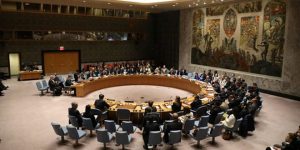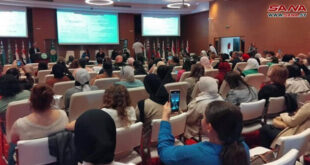New York, SANA – Russia vetoed Thursday night a US-proposed draft resolution at the Security Council on extending the mandate of the UN-Organization for the Prohibition of Chemical Weapons (OPCW) Joint Investigative Mechanism (JIM) probing chemical weapons use in Syria.
Bolivia voted against the draft resolution, while Egypt and China abstained. The mandate of the JIM ended on Thursday.
In October, Russia vetoed a similar US draft resolution.
Addressing the Security Council following the vote, Syria’s Permanent Representative to the UN Dr. Bashar al-Jaafari affirmed that Russia’s vote against the US draft resolution has saved the Security Council against the manipulation of UN mechanisms and maintained the integrity of the provisions of the UN Charter.
Al-Jaafari made it clear that what is going on in the framework of this and other similar Security Council sessions is part of a pre-planned plot against Syria through accusing its government of using chemical weapons, a plot he said was attested to in a report published by the UK-based Daily Mail newspaper in 2013.
The report, which was withdrawn from the newspaper’s website at the time, cited e-mails exchanged between senior officials at the British Britam Defense Ltd company on a plot approved by Washington whereby Qatar and Turkey would provide funding and support to the “rebels” in Syria to enable them to use chemical weapons to later blame the Syrian government, according to al-Jaafari.
“Russia didn’t hinder the work of the Security Council, but rather prevented the repetition of the tragedy of Iraq and Libya and saved the integrity of the provisions of the [UN] Charter,” said al-Jaafari, regretting that some parties at the Council deal with the false justifications of the “rude invasion” of Iraq and Libya as a transient and forgettable event in the memory of the Council and as a “event that can be repeated anywhere with impunity.”
“Fortunately, there are some at this Council whose memory is still strong and doesn’t forget,” he added.
He went on saying that the Russian vote against the US draft resolution “saves this Council from the manipulation targeting the UN mechanisms”.
While stressing Syria’s belief that the UN plays a major role in finding solutions to crises, the Syrian Ambassador to the UN regretted that the mechanisms and committees formed by the UN to investigate chemical weapons use incidents in Syria would be prevented from being able to reach the truth under pressure by some influential countries at the international organization.
He cited in particular the repeated cases when the Syrian government’s requests that UN missions be sent to Khan al-Assal town in Aleppo, the first area where chemical weapons were used in Syria by terrorist groups on March 19, 2013, were foiled after the deliberate “creation” of the chemical weapons use incident in Damascus’ Eastern Ghouta.
He elaborated that the UN investigation committees and teams have not been allowed to work with transparency, neutrality and independence because the intentions of “three countries” at the Security Council and their regional agents were focused on conniving with the terrorist groups to “create” chemical and toxic material use incidents against Syrian civilians to blame the Syrian government “as those couldn’t find a more dangerous weapon by which they can implement their subversive interventional agendas in Syria after they exhausted all their tools to achieve that aim.”
Al-Jaafari reiterated that Syria doesn’t object to setting up mechanisms that are “professional, independent and honest” to determine the responsibility behind the chemical weapons use in Syria, stressing that the Russian-Chinese draft resolution that has been opposed by the US, Britain and France is aimed at helping the JIM to upgrade its mandate according to the relevant internationally approved standards away from the politicization and pressure practiced by these three countries.
The Syrian diplomat affirmed that any draft resolution that doesn’t consider these standards and guarantees, including finding decisive material evidence, would only be a desperate attempt to go on with a dangerous series that relies on remote investigations, false witnesses and Jabhat al-Nusra-provided information.
Before Thursday’s vote was held, Russian Ambassador to the United Nations Vassily Nebenzia announced Russia’s withdrawal of its draft resolution on the JIM mandate due to UN’s refusal to hold a vote on it following that on the US draft resolution.
In a statement delivered following the Russian veto, Nebenzia said that the “show” played at the Security Council today is fabricated by west to force Russia out from the political settlement in Syria and question its role in resolving the crisis there.
He warned that the UN and the proponents of its draft resolution will be responsible for stopping the JIM mandate’s work.
Russia’s UN Ambassador noted that Russian experts discussed the UN draft resolution, adding “we patiently explained that we can’t look seriously into this proposal because it is imbalanced and includes methodical errors.”
Nebenzia said What is going on a the security Council today reminds of the situation in Iraq 15 years ago when the American envoy deliberately misled the international community, including the Council, to prepare the “appropriate soil” for intervention in Iraq.
He went on saying that the draft resolution proposed by Russia and Bolivia aimed at extending the mandate of the JIM by improving the quality of its work significantly and establishing transparent and clear standards in order to avoid any further manipulation of its investigations.
For his part, Bolivian Ambassador to the UN, Sacha Sergio affirmed that there is politicization in the work of the JIM, stressing that any extension of its mission should be objectively and systematically done to ensure its impartiality so as to reach neutral, comprehensive and credible investigations where the mistakes of the past shouldn’t be repeated.
China’s UN Ambassador Liu Jieyi said that Joint Investigation Mechanism should conduct impartial, independent and professional investigations and draw on specific evidence to ensure the credibility of the investigation into the alleged use of chemical weapons in Syria.
Shaza/H. Said
 Syrian Arab News Agency S A N A
Syrian Arab News Agency S A N A





